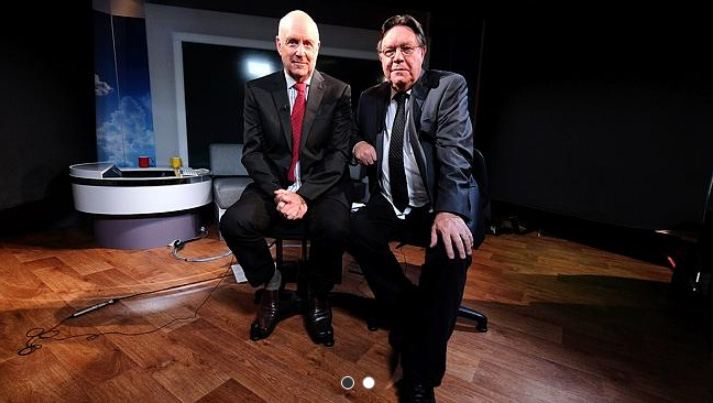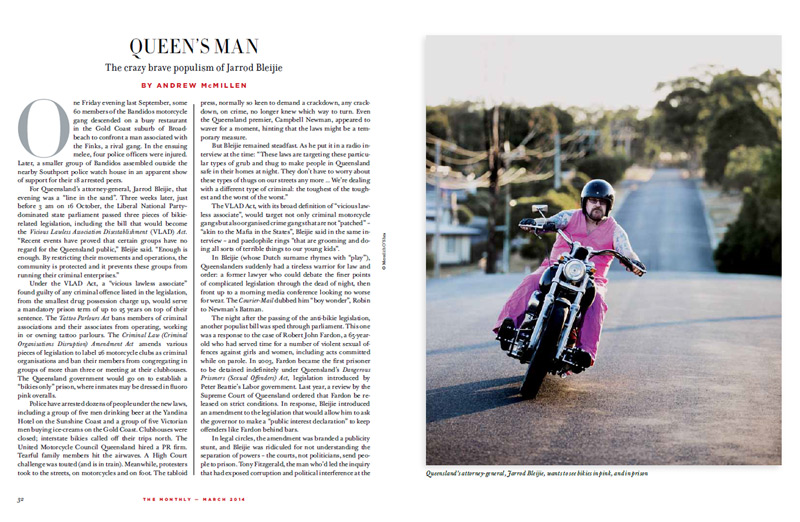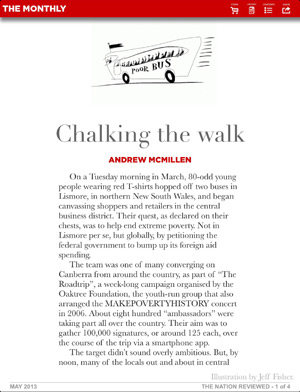The Weekend Australian Review story: ‘Clarke & Dawe: In The Line of Satire’, February 2015
A feature story for The Weekend Australian Review that appeared on the cover of the February 14 2015 issue. An excerpt appears below.
Clarke & Dawe: In The Line of Satire
Andrew McMillen delves into Clarke & Dawe, the sharpest two-and-a-half minutes on television.
On a Wednesday morning in mid-November, a man picks up that day’s edition of The Age from a neighbouring table in a cafe in Melbourne’s Fitzroy. He skims the headlines and sips a flat white between turning the pages. What is he looking for? “Something I haven’t seen before,” he says. The 66-year-old is a picture of unhurried composure. To outward appearances, he’s an inner-city retiree happily fulfilling a daily routine of caffeine consumed alongside current affairs. On closer examination, however, this man is engaged in the serious, difficult business of turning news into satire, so that his work may make us laugh while also making us think.
When a girl of about three pauses by his table after spilling sultanas on the floor, John Clarke looks up and greets her with a sonorous hello. The young girl is momentarily entranced by one of the most familiar faces on Australian television. She clocks his bald dome, the unkempt patch of white hair that circles behind his ears, the slight smile and the handsome black overcoat with matching slacks topped by a black bowler hat. Most of all, though, she’s drawn in by a pair of bright blue eyes that sparkle with a tangible sense of knowingness, as if their owner lives in a state of perpetual amusement at life itself.
His task today is much the same as it has been for the past 25 years. Once a week, he writes and records a short television program that distils newsworthy issues into a satirical dialogue between two men: Bryan Dawe and himself. On camera, Clarke adopts the guise of a public figure in name alone. Dawe queries his guest in the public interest, while Clarke’s character — anyone from the prime minister or a premier, down to a lowly economic consultant — alternately answers and evades questions. The resulting two-and-a-half minute program, Clarke & Dawe, airs nationally at 6.57pm every Thursday, immediately before the ABC’s nightly news bulletin. More often than not, it is the among the week’s sharpest commentary on up-to-the-minute matters relating to Australian politics and public life.
Pages of The Age keep turning while mid-morning traffic streams by on Gertrude Street. On today’s agenda are several competing topics, which Clarke discusses casually while continuing to take in the newsprint. Throughout the week, he says, “I take notes subconsciously, but I don’t have a piece of paper.” This is how his writing days always begin: with a blank page, as it were, but not with a blank mind. “There’s been quite a lot of that in the media [with regard to the G20]. There are some very big things being discussed. That huge China trade deal, that was a nine-year job. The complexities in that must be colossal, and it’s a bit ridiculous to have it discussed at the level of ‘my dad’s bigger than your dad’.”
With this, Clarke smiles wryly, as he so often does when he knows he has delivered a funny line. “So there’s that,” he continues. “Domestic politics hasn’t much changed lately because they’ve still not got the budget through, and aspects of that have come apart in their hands a little bit. And then the global economy is always quite interesting, because when I was a kid you could not spend more than you had. Now you can spend whatever you like. Governments have started doing that in order to create what they call growth, which has not been an unalloyed success in parts of Europe” — the corners of his mouth curl upward — “because growth can just as easily go backwards as forwards.”
To read the full story, visit The Australian.


